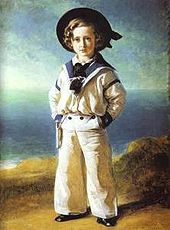Dear Donald,
Perhaps, we avoided a family feud with the United States not playing
Australia.
Enjoy.
Pictured above: Traditionally made and inspired from a kudu horn, the vuvuzela was used to summon distant villagers to attend community gatherings. The vuvuzela is most used at soccer matches in South Africa, and it has become a symbol of South African soccer as the stadiums are filled with its loud and raucous sound that reflects the exhilaration of supporters.
| ANOTHER LADY IN WAITING! |
Ray Jerrems, Our Genealogist, Historian
A Royal Connection

In the May 2010 edition of the Jerrems Journal I mentioned that Sandra Walcyk had a story about a relative who was a Lady in Waiting to Queen Victoria. Sandra (whose ancestors came from the Wappenham side of the family) has recorded this story on her Family Tree under the entry for William Elthorpe. Here is what Sandra said:
“Here is a story passed down by my great grandmother, Alice Sarah Elthorp Lindsay.
Her grandmother, Sarah Burt Aston Elthorp (born about 1811 in England) was once a “Lady in Waiting” in Queen Victoria’s Court.”
In support of this story Sandra then goes on to cite an extract from a book entitled Oneida County New York and Its People, Biographies by Daniel Wager, published 1896, which said in part (I have only included the relevant parts, and have added “(Snr)” and “(Jnr)” to differentiate between the two men):
“Elthorp, William (Jnr), was born in London, England in 1837, son of William, who was born in England and was a gas manufacturer and later a railroad conductor in England and France. He became wealthy and at his death owned some 600 acres of land. Mr. Elthorp (Snr) married Sarah Burt, by whom he had these children: William (Jnr), Sarah, George, Alice, Lucy, John and Mary. They came to America in 1848, settling in Forestport, where Mr. Elthorp (Snr) devoted his time to farming and lumbering up to the time of his death in 1880. His wife now resides in Forestport, aged eighty-five years. When nineteen years of age William (Jnr) went to South Carolina and Georgia, where he was engaged in railroad tunnelling…Mr. Elthorp (Jnr) enjoys the distinction of having been a playmate of Prince Albert when a boy.”
Sandra concludes “The last sentence in this article suggests that the Family Story is correct, as Queen Victoria had a son, Prince Albert, who was a few years younger than William Elthorp (Jr).”
My comments: William Jnr’s mother was living in a town near Utica (Forestport) when the book was published, and William Jnr, who died in 1904, was still alive, so there is a good chance that William’s mother, or William himself, or one of his siblings, related the item “Mr. Elthorp (Jnr) enjoys the distinction of having been a playmate of Prince Albert when a boy.” to the author of the book. Prince Albert Jnr (later King Edward Vll) pictured above at the age of five, was born in 1841
| THE STORY OF THE CONFEDERATE PIG |
Ray Jerrems with Research by Sandra Walcyk

While we are in the 19th Century in the United States, here we have another interesting item recorded on Sandra’s Family Tree. It is a letter to the editor of a newspaper (the “Rome Sentinel”) from a soldier serving in the Civil War in Virginia. Rome is a short distance from Utica where Sandra’s side of the Jerrems family lived, and where a number of Jerrems men enlisted (see the Jerrems Journal of November 2009). The 4th Oneida regiment was a sister regiment to the Utica Regiments.
From the 4th Oneida Regiment
COMICAL ADVENTURE OF A PICKET.
Camp Haskins, Portsmouth, Va.,
July 2, 1863.
EDITORS ROME SENTINEL:
DEAR SIRS: With all the labor, suffering and anxiety we as soldiers have to endure, we often have our fun, and well and right heartily do we enjoy it.
A rather laughable circumstance occurred a short time since in our camp, which I will relate, to show you that the “Oneida 4th” is not entirely gone up, if we are way down here in a Virginia Swamp.
Bob-a very notable and incomprehensible character, withal a most incorrigible wag, was put on guard one dark night, and in a very responsible position at that, but as Bob is as courageous as he is funny he was deemed the man for the place and the occasion. The guard was posted that night by the Major in person, and he gave the most rigid orders that no living thing must pass that beat without the countersign.
Bob took his position at his post determined to be very vigilant, and the sequel shows that he was “right smart”, I reckon. Bob had walked his beat about an hour, when he heard the sound of an approaching object. He listened very attentively for a moment, and then began again to tread his beat as usual. Soon a lusty porker belonging to one of our many neighboring “Secesh” [Confederate] farmers, came lumbering along directly towards Bob’s beat, so closely that Bob knew at once what it was that was approaching. But being determined that his orders should be lived up to the very letter, he at once gave the challenge. “Who goes there?” No reply. Mr. Porker waddled along toward the beat as though nothing had happened. Halt! cries Bob, and bringing his gun to a “ready” just as porker was crossing his beat he again called on him to halt, which it did not do. Bang went Bob’s gun, and down came Mr. Porker, a victim of his disobedience. The camp was all in a furore [sic] in a second, and down came the Major, Officer of the Day, and several more who were anxious to know what had happened, fearful that the Rebs were upon us.
The Major and others soon arrived, finding Bob quietly standing by Mr. Porker, loading his gun as if nothing had happened. What did you shoot the hog for, said the Major to Bob? I done it, sir, to carry out to a letter my orders. When I was put on post sir, I was ordered by you, sir, to let no living thing pass my beat without the countersign. This thing tryed [sic] to do it, and I put a stop to his impudence, sir, all right, sir, I suppose, sir, said Bob, with imperturbable gravity.
Yes, yes, Bob, all right, but you may let hogs and all dumb beasts pass, hereafter, without the countersign.
Bob very demurely said, ay, ay, sir, always obey orders, sir, military orders, sir.
It will be a long time ere we shall forget Bob’s hog adventure.
Nothing new in camp, the same old story,
Very respectfully,
ORDERLY.
Ray’s comment: No doubt the pig made a welcome addition to the diet of the soldiers.
| A MODERN-DAY JERREMS REUNION |
Ray Jerrems, Our Genealogist, Historian
Having spent time in the United States in the 19th Century, it is now time to return to Australia in the 21st Century.
My wife Diane and I visited Anita and George Veale on 30th April 2010 while we were on a holiday in Melbourne. To our very pleasant surprise Helen Mitchell was also there, and she showed us photographs of her family. We had a sumptuous afternoon tea and reminisced at length.
Readers will remember that Anita and Helen live in adjacent suburbs and one of Anita’s granddaughters went through High School with one of Helen’s daughters. When Anita and Helen (long term residents in the area) finally met up several months ago they were amazed to realise that they recognised each other. Their common ancestor was my great grandfather’s brother Robert Cane Jerrems and, on my estimate, the families would have lost contact with each other over a hundred years ago before the First World War. Another amazing thing to remember is that I had letters from Anita and Helen which (I happened to notice) showed that they live near each other; I do not normally record peoples’ addresses.
Amongst the many anecdotes exchanged at our get-together was Anita’s story about her great uncle Jack McShane. Jack owned a Pool Room in Hawthorn, not far from where the early Jerrems families grew up. Among his customers was the notorious Melbourne gangster “Squizzy” Taylor (1888-1927) who died later after a gangland shoot-out. Jack is referred to in a book about Squizzy Taylor. Jack was also an accomplished roller skater.
Editors Note: Anita’s father was Arthur Ernest Jerrems, who in turn was the grandson of Robert Cane Jerrems, one of the family who migrated to Australia in the 1850s. Anita and her renown football family were featured in Edition 30 October 2007
| In Memoriam – Tom Haley |
Donald Jerrems
One of our avid Jerrems Journal readers passed away in May after a short illness. Tom Haley was 89 years old; he was a widower for about 12 years. He had no children.
Tom was not a part of the Jerrems family tree. He was a neighbor/friend here in Huntersville North Carolina.
He enjoyed using his computer, which is how I got to know him on a Sunday afternoon in 2005 when he needed assistance. Over the years, we drank rum and cokes while watching football games together. I also helped him out getting him started on Match.com. We took his digital picture and uploaded it to Match. After many on-line initiated dates, he finally found a girl friend in Florida; they exchanged visits several times. Tom and Carol were engaged to marry this year.
Tom provided enthusiastic feedback to me after receiving editions of the Jerrems Journal. (I shared the emails with Ray.)
I will miss the good times with Tom. He always encouraged me to visit Ray in Sydney. Maybe I will some day.

